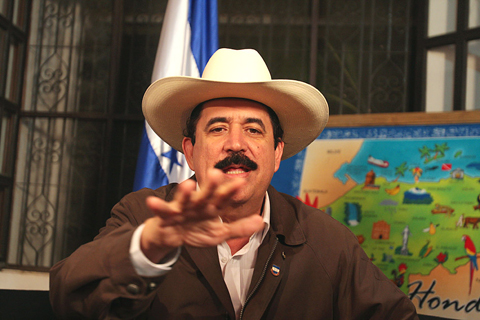The interim foreign minister of Honduras rapidly extinguished hopes on Wednesday of a last-ditch deal to resolve the deep crisis there, insisting that ousted president Manuel Zelaya could not return.
Shortly beforehand, crisis mediator and Costa Rican President Oscar Arias proposed that Zelaya return today, in an expansion of a first plan already rejected by the de facto leaders who backed the army’s expulsion of the Honduran leader on June 28.
“The return of Mr Zelaya as president ... impossible,” interim foreign minister Carlos Lopez Contreras said on CNN’s Spanish edition in Costa Rica.

PHOTO: REUTERS
Everything else was up for negotiation, he said.
De facto leader Roberto Micheletti said in Honduras that he would withhold comment until the negotiators returned from Costa Rica.
Meanwhile, Zelaya told Venezuela’s Telesur channel that the crisis mediation “had practically failed.”

PHOTO: AFP
The interim leaders “have decided to deny all possibility of an agreement,” he said.
The second plan proposed in Costa Rica by Arias, a Nobel Peace Prize winner, maintained the demand for Zelaya’s return, but also included a timetable for the accords and “suggestions” from the interim government.
Zelaya’s previous foreign minister, Milton Jimenez, said in Guatemala that “they accept the agreement.”
If both sides failed to agree, Arias suggested they turn to other international bodies, including the Organization of American States, to seek a solution “to the worst crisis in almost three decades of the young Honduran democracy.”
Arias’ new plan also called for Zelaya to remain in the presidency until the end of the current period in January.
It also included setting up a national unity government, advancing November elections by one month, amnesty for political crimes for six months and the immediate lifting of sanctions on Honduras.
The new text also implied the return of de facto leader Micheletti to head the Congress and called on Zelaya to give up his plans to reform the Constitution — a key issue in his dispute with the country’s courts, military and Congress.
A frustrated Arias said that Honduras had turned into the North Korea or Albania of Central America.
Despite increasing international isolation, the interim leaders have maintained that Zelaya would be arrested if he attempted to return.
Zelaya, exiled in neighboring Nicaragua, has said he would return “by air, land or sea.”
Hondurans remain deeply split over the possibility of his return, with many fearing more violence after Zelaya’s spectacular first attempt left at least one protester dead in clashes with soldiers.
“We don’t like you, Mel,” one banner read in Wednesday’s demonstration, using Zelaya’s nickname.
A top European official called on both sides to ease the tension, after the EU this week suspended 65.5 million euros (US$93 million) in aid to Honduras.
“Everything must be done so there is a peaceful solution, not a military confrontation,” EU External Relations Commissioner Benita Ferrero-Waldner said in Mexico.

POLITICAL PRISONERS VS DEPORTEES: Venezuela’s prosecutor’s office slammed the call by El Salvador’s leader, accusing him of crimes against humanity Salvadoran President Nayib Bukele on Sunday proposed carrying out a prisoner swap with Venezuela, suggesting he would exchange Venezuelan deportees from the US his government has kept imprisoned for what he called “political prisoners” in Venezuela. In a post on X, directed at Venezuelan President Nicolas Maduro, Bukele listed off a number of family members of high-level opposition figures in Venezuela, journalists and activists detained during the South American government’s electoral crackdown last year. “The only reason they are imprisoned is for having opposed you and your electoral fraud,” he wrote to Maduro. “However, I want to propose a humanitarian agreement that

ECONOMIC WORRIES: The ruling PAP faces voters amid concerns that the city-state faces the possibility of a recession and job losses amid Washington’s tariffs Singapore yesterday finalized contestants for its general election on Saturday next week, with the ruling People’s Action Party (PAP) fielding 32 new candidates in the biggest refresh of the party that has ruled the city-state since independence in 1965. The move follows a pledge by Singaporean Prime Minister Lawrence Wong (黃循財), who took office last year and assumed the PAP leadership, to “bring in new blood, new ideas and new energy” to steer the country of 6 million people. His latest shake-up beats that of predecessors Lee Hsien Loong (李顯龍) and Goh Chok Tong (吳作棟), who replaced 24 and 11 politicians respectively

Young women standing idly around a park in Tokyo’s west suggest that a giant statue of Godzilla is not the only attraction for a record number of foreign tourists. Their faces lit by the cold glow of their phones, the women lining Okubo Park are evidence that sex tourism has developed as a dark flipside to the bustling Kabukicho nightlife district. Increasing numbers of foreign men are flocking to the area after seeing videos on social media. One of the women said that the area near Kabukicho, where Godzilla rumbles and belches smoke atop a cinema, has become a “real

‘WATER WARFARE’: A Pakistani official called India’s suspension of a 65-year-old treaty on the sharing of waters from the Indus River ‘a cowardly, illegal move’ Pakistan yesterday canceled visas for Indian nationals, closed its airspace for all Indian-owned or operated airlines, and suspended all trade with India, including to and from any third country. The retaliatory measures follow India’s decision to suspend visas for Pakistani nationals in the aftermath of a deadly attack by shooters in Kashmir that killed 26 people, mostly tourists. The rare attack on civilians shocked and outraged India and prompted calls for action against their country’s archenemy, Pakistan. New Delhi did not publicly produce evidence connecting the attack to its neighbor, but said it had “cross-border” links to Pakistan. Pakistan denied any connection to